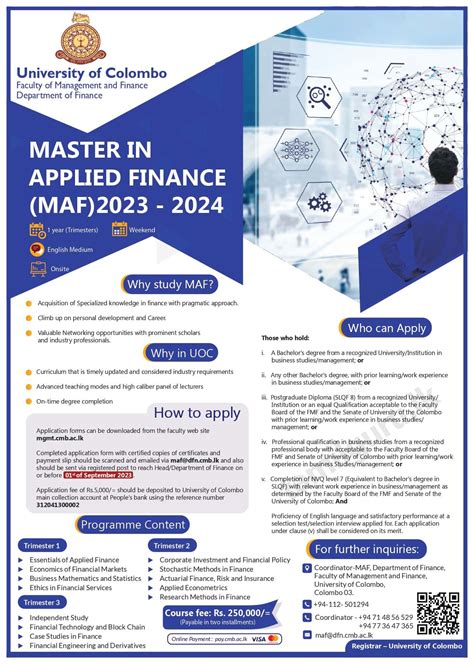Tentu, berikut adalah posting blog tentang gelar keuangan terapan:
Applied Finance Degree: A Complete Guide
Are you passionate about finance and looking for a career that combines theoretical knowledge with practical application? An applied finance degree might be the perfect fit for you. This comprehensive guide will explore everything you need to know about this rewarding field of study.
What is an Applied Finance Degree?
An applied finance degree focuses on the practical application of financial theories and concepts. Unlike traditional finance degrees that emphasize theoretical frameworks, applied finance programs equip students with the skills and knowledge necessary to tackle real-world financial challenges. The curriculum typically includes a strong emphasis on quantitative analysis, financial modeling, and data interpretation, preparing graduates for immediate entry into the workforce.
Key Features of an Applied Finance Program:
- Emphasis on Practical Skills: The curriculum prioritizes hands-on experience through case studies, simulations, and real-world projects.
- Quantitative Focus: You'll develop a strong foundation in statistical analysis, econometrics, and financial modeling.
- Industry-Relevant Curriculum: Courses cover current trends and technologies in the finance industry.
- Networking Opportunities: Many programs offer opportunities to connect with industry professionals through internships, guest lectures, and career fairs.
What Will You Learn in an Applied Finance Degree?
A typical applied finance degree program covers a broad range of topics, including:
- Financial Modeling: Creating and using financial models to analyze investment opportunities and make informed decisions. This often involves using software like Excel and specialized financial modeling platforms.
- Corporate Finance: Understanding how corporations raise capital, manage their finances, and make investment decisions.
- Investment Management: Learning about various investment strategies and portfolio management techniques.
- Financial Markets: Gaining a deep understanding of how different financial markets operate, including stocks, bonds, and derivatives.
- Data Analysis: Mastering data analysis techniques to extract insights from financial data and make better investment decisions.
- Risk Management: Learning how to identify, assess, and mitigate financial risks.
Career Paths with an Applied Finance Degree
Graduates with an applied finance degree are highly sought after by employers in various sectors. Some popular career paths include:
- Financial Analyst: Analyzing financial data, providing investment recommendations, and preparing financial reports.
- Portfolio Manager: Managing investment portfolios for individuals or institutions.
- Investment Banker: Advising companies on mergers and acquisitions, raising capital, and other financial transactions.
- Risk Manager: Identifying and mitigating financial risks for companies and institutions.
- Quantitative Analyst (Quant): Developing and implementing sophisticated quantitative models for financial markets.
- Actuary: Analyzing and managing financial risks in the insurance and other industries.
Is an Applied Finance Degree Right for You?
An applied finance degree is a great option if you:
- Enjoy working with numbers and data.
- Have a strong interest in finance and investing.
- Are detail-oriented and analytical.
- Possess strong problem-solving skills.
- Are comfortable working with computers and software.
Conclusion
An applied finance degree provides a strong foundation for a successful career in the dynamic world of finance. By combining theoretical knowledge with practical skills, graduates are well-prepared to tackle the challenges and opportunities of this exciting field. If you're passionate about finance and want a career with real-world impact, an applied finance degree is definitely worth considering.
